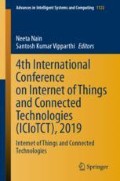Abstract
Lean manufacturing concept is being widely used for several decades by industries and service organizations to ease operational complexity and enhance productivity. It is so despite the debated criticism about drifting definition and priorities of lean with time. In 1980s, focus of lean was on reduction of waste. Then in 1990s, priority shifted to quality, cost and delivery. Again, in 2000 the focus shifted to customer value. On the other hand, lean experts and authors advocated such changes to be evolutionary and natural with the passing time, keeping the intent of lean intact. On analysis, it is found that lean operates with multi-model advantage using a mix of tools and practices best suited for the company’s position & the type of industry. The lean approach raised excellence of organization to higher level through process standardization, continuous improvement culture development and workers empowerment on production line. Once again, with the changing market expectations many companies require now new approaches to deal with multiple process complexity and operational challenges. Consequently, a usual set of innovative digital technology known as Industry 4.0 and has appeared as new approach in the manufacturing sector. It claims to create a smart system of machines, components, products, properties, process and ICT systems in the whole value chain to partake a smart factory. Lean tools have been using simpler devices to detect abnormalities and stop assembly line or machine to improve human reliability. Systems and devices like ‘andon’, Jidoka, contact sensors, thermocouples, and photoelectric devices are some examples. Industry 4.0 differs in technologies to achieve the common goals as lean but with automation.
Access this chapter
Tax calculation will be finalised at checkout
Purchases are for personal use only
References
Kagermann, H., Hebig, J., Hellinger, A., Washlster, W.: Recommendation for Implementing the Strategic Initiative INDUSTRIES 4.0: Securing the Future of German Manufacturing Industry: Final Report of the Industries 4.0 Working Group, Forschungsunion (2013)
Oesterreich, T.D., Teuteberg, F.: Understanding the implication of digitization and automation in the context of Industry 4.0: a triangulation approach and elements of a research agenda for the construction industry. J. Comput. Ind. 83, 121–139 (2016)
Sharma, S., Gandhi, P.J.: Scope of optimizing ICT objectives applying lean principles: an exploratory review. In: International Conference on ICT in Business, Industry & Government (ICTBIG), Catalog No. CFP16F71-POD. IEEE Xplore, IEEE-USA (2016). https://doi.org/10.1109/ICTBIG.2016.7892667. ISBN(e): 978-1-5090-5515-9, ISBN (p): 978-1-5090-5515-6
Ing Joachim, M.: A survey report: lean yesterday, today and tomorrow. Staufen AG and PTW of Technical University (TU), Germany (2016)
Womack, J., Jones, D., Roos, D.: The Machine that Changed the World. Simon & Schuster, New York (2007). ISBN 13: 978-1-8473-7055-6
Liker, J.: The Toyota Way: 14 Management Principles from the World’s Greatest Manufacturer. Tata Graw-Hill Publishing Company Limited, Noida (2006). Indian Version. ISBN-0-07-058747-7
Shah, R., Ward, P.T.: Defining and developing measures of lean production. J. Oper. Manag. 25(4), 785–805 (2007). https://doi.org/10.1016/j.jom.2007.01.019
Wagner, T., Herrmann, C., Thiede, S.: Industry 4.0 impacts on lean production systems. Procedia CIRP 63, 125–131 (2017)
Kaufmann, T.: Geschäftsmodelle in Industrie 4.0 und dem Internet der Dinge: der Weg vom Anspruch in die Wirklichkeit. Springer (2015). https://doi.org/10.1007/978-3-658-10272-2
Lee, J., Bagheri, B., Kao, H.A.: Recent Advances and Trend of Cyber-Physical Systems and Big Data Analysis in Industrial Informatics. SAGE Publishing, New Delhi (2014)
Geisberger, E.E., Broy, M.M.: Agenda CPS – Integration Cyber-Physical System. Springer (2012)
Muller, E., Chen, X.-L., Riedel, R.: Challenges and requirement for the application of Industry 4.0: a special insight with the usage of cyber-physical system. Chin. J. Mech. Eng. 30(5), 1050 (2017)
Fujino, N., Konno, Y.: Industry 4.0 and significance for Japanese manufacturing. NRI Papers No. 210, September 2016 (2016)
Daniel, K., Alike, H., Johannes, S., Daniel, S., Claudio, K.: When Lean Meets Industry 4.0 (2017). https://bcg.com/ publications/ 2016/ learning manufacturing operation
Senders, A., Elangeswaran, C., Wulfsberg, J.P.: Industry 4.0 implies lean manufacturing: research activities in Industry 4.0. Research Gate (2016). http://www.researchgate.net/publication/308751310
Lewandowski, M., Gath, M., Werthmann, D., Lawo, M.: Agent-based control for material handling system in in-house logistics – towards cyber-physical systems in in-house- logistics utilizing real size, smart objects, systems and technologies (smart system). In: Proceedings of 2013, European Conference, Erlangen/Nuremberg, Germany, pp. 1–5. VDF (2013)
Wan, Y.L., Zhu, H.P., Mu, Y.P., Yu, H.C.: Research on IoT–based material delivery system of the mixed-model assembly workshop. In: Proceedings of 2013, 4th International Asia Conference on Industrial Engineering and Management Innovation (IEMI 2013) (2014)
Brettel, M., Frienderichen, N., Keller, M., Rosenberg, M.: How virtualization, decentralization and network building change the manufacturing landscape: an Industry 4.0 perspective. Int. J. Mech. Ind. Sci. Eng. 8(1), 37–44 (2014)
Lee, J., Kao, H.A., Yang, S.: Service innovation and smart analytics for Industry 4.0 and big data environment. Procedia CIRP 16, 3–8 (2014). https://doi.org/10.1016/j.procir.2015.02.001
Haddara, M., Elragal, A.: The readiness of ERP systems for the factory of the future. Procedia Comput. Sci. 64, 721–728 (2015). https://doi.org/10.1016/j.procs.2015.08.598
Schuh, G., Gartzen, T., Rodenhauser, T., Marks, A.: Promoting work-based learning through Industry 4.0. Procedia CIRP 32, 82–87 (2015). https://doi.org/10.1016/j.procir.2015.02.213
Nicoletti, B.: Lean and automate manufacturing and logistics. In: Advances in Production Management Systems, Sustainable Production and Service Supply Chains, pp. 278–285. Springer, Heidelberg. http://dx.doi.org/10.1007/978-3-642-41263-9_34
Brauner, P., Zietle, M.: Human factor in production systems. In: Advances in Production Technology, pp. 187–199. Springer (2015). http://dx.doi.org/10.1007/978-3-319-12304-2-14
Mungovan, P.: “Lean Performance Management” for Public Sector: An Oracle White Paper on Lean Performance Management” USA: Oracle Corporation (2009)
Author information
Authors and Affiliations
Corresponding author
Editor information
Editors and Affiliations
Rights and permissions
Copyright information
© 2020 The Editor(s) (if applicable) and The Author(s), under exclusive license to Springer Nature Switzerland AG
About this paper
Cite this paper
Majiwala, H., Sharma, S., Gandhi, P. (2020). Lean and Industry 4.0 Strive to Create Smart Factory Through Integration of Systems: An Exploratory Review. In: Nain, N., Vipparthi, S. (eds) 4th International Conference on Internet of Things and Connected Technologies (ICIoTCT), 2019. ICIoTCT 2019. Advances in Intelligent Systems and Computing, vol 1122. Springer, Cham. https://doi.org/10.1007/978-3-030-39875-0_20
Download citation
DOI: https://doi.org/10.1007/978-3-030-39875-0_20
Published:
Publisher Name: Springer, Cham
Print ISBN: 978-3-030-39874-3
Online ISBN: 978-3-030-39875-0
eBook Packages: EngineeringEngineering (R0)

